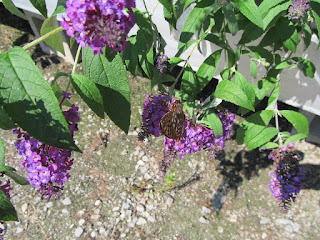 |
| Bee on Anise Hyssop |
If you follow my blog, you may recall that last year, I inadvertently bought some plants from Home Depot that had been treated with Neonicotinoids. This class of pesticides adversely affect bees by interfering with their navigation capabilities, lowering their immune systems and fertility rates, all things which can result in premature death.I wrote to management and received a generic response. But, several months later, the result of increased public pressure resulted in Home Depot making a pledge in December to phase out all plants treated with neonicotinoids by 2018 (http://www.commondreams.org/newswire/2015/12/03/home-depot-phase-out-bee-killing-pesticides) joining other similar large chain retailers such as Lowes.
A recent study by Friends of the Earth Gardeners Beware 2016 Followup Report reported on the progress, and the work left to be done, toward the elimination of the use of neonicotinoid pesticides on ornamental plants. In 2013 the results showed that 54% of the plants sampled contained neonicotinoids, whereas in 2016 that percentage had dropped to 23%. While these numbers are encouraging, there are still large retailers, including Walmart, Ace and True Value Hardware stores that have yet to take action against selling plants that have been treated with imidacloprid or similar neonicotinoid products.
We should all remember that, as consumers, we can influence what products are and are not offered for sale by retailers. Make your voices heard, by writing letters, talking with management and making it clear that you care about the fate of pollinators and will only purchase plants from that are free of neonicotinoid pesticides.
Some garden centers take the protection of pollinators a step further, through positive actions, like Cole Gardens in Concord, NH which raised monarchs this summer and then held a butterfly information and release event this past weekend.
 |
| The crowd admires the monarchs prior to their release |
|
|
The turnout to watch the butterflies take flight was tremendous and it was encouraging to hear so many people talk about the plight of the monarch and their desire to do what they can to help in their own neighborhoods. I am more than happy to pay a little more for plants if it means that I will support a business that understands the importance of selling plants that not only look pretty, but that are also good for the environment.



No comments:
Post a Comment